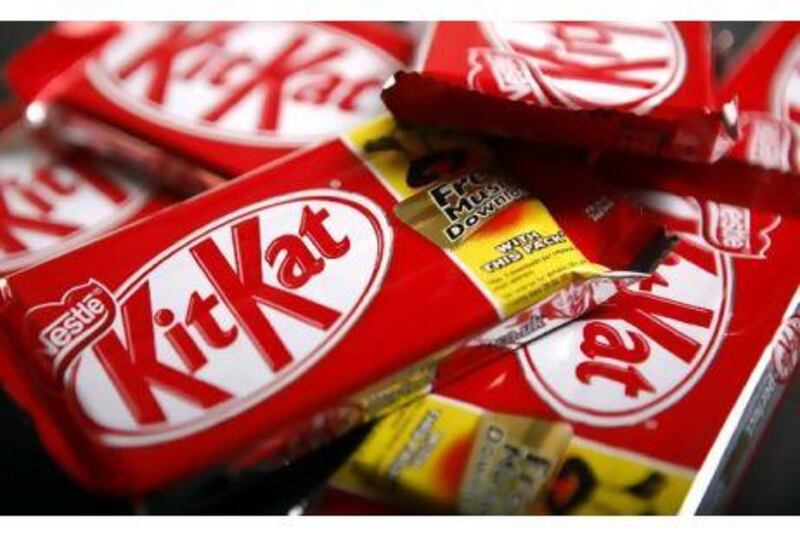Nestle, the largest food and beverage company in the world, plans to gear up its expansion in the Middle East, investing US$400 million (Dh1.46 billion) during the next three years.
Paul Bulcke, the chief executive of Nestle, said the company's sales in emerging markets had reached about 35bn Swiss francs (Dh129.97bn), which represents about 35 per cent of global turnover. He expects this to reach 45 per cent in the years ahead as the population and spending power increases in burgeoning markets such as the Middle East.
"The Middle East, with its 200 million inhabitants, holds great promise for Nestle, and we have been seeing steady growth over the years," he said.
Mr Bulcke's comments came at the official inauguration of Nestle's Dh500m factory in Dubai's Technopark, the first confectionery-making facility it has launched in about a decade.
The factory, spread across 515,000 sq ft, began producing KitKat chocolate bars in October. It also produces Nido powdered milk and Pure Life bottled water.
Last year, Nestle's business in the region contributed about $1.5bn in sales, representing 1.5 per cent to 2 per cent of global turnover.
Nestle plans to double its sales to $3.2bn by 2017, said Yves Manghardt, the chairman and chief executive of Nestle Middle East. It is investing heavily to reach that goal.
Since Nestle Middle East set up a regional office in 1997 it has invested more than $400m, and over the next three years it plans to invest a further $400m in production lines and factories in places such as Lebanon, Syria and Saudi Arabia, said Frits Van Dijk, Nestle's executive vice president and zone director for Asia, Oceania, Africa and the Middle East.
The research firm Euromonitor International predicts that retail sales of chocolate confectionery are expected to reach $3.9bn in the Middle East and Africa this year, up 5 per cent from last year.
Other confectioners have taken note. Mars, the third-biggest food manufacturer and the maker of Snickers and Twix chocolate bars, opened a $40m factory in Jebel Ali in May, with the aim of doubling the number of sweets it produces in Dubai.
Sales volumes of confectionery in the MENA region will grow another 20 per cent between 2010 and 2015, but an increasingly health-conscious population may be a barrier, says Euromonitor.
"Demand in the region will be driven by gradual economic recovery and the expansion of relatively more expensive confectionery categories like chocolate among middle-class consumers," the researcher said in a recent report.
"Conversely, sales growth will be partly constrained by health or obesity concerns surrounding sugar and chocolate confectionery in large urban areas."
In line with this trend, Nestle plans to focus on healthier products through its Nestle Health Science arm, a wholly owned subsidiary that will become operational on January 1. It has also established the Nestle Institute of Health Sciences, which will be part of the conglomerate's global research and development network.
"Food should be pleasurable, but we should build in that pleasure some nutritional arguments," said Mr Bulcke. "That's why we have this research and development set-up."
He said Nestle did not advertise to children under six, but would target under-12s if there was a nutritional element.
The trend towards healthy eating, combined with the ageing population, is expected to boost Nestle's nutrition-related sales, which is currently worth about $1.6bn.
"We see at the other end this opportunity somewhere between food and pharma. You need more nutrient-dense products," said Mr Bulcke.
Demand for halal food spreads through Europe
The Swiss consumer goods giant Nestle is increasingly importing halal foods from its factories in Islamic countries to satisfy the demand for Sharia-compliant food in western markets.
While the demand for halal foods is growing in countries such as Pakistan and in the Middle East as the population grows, the trend is also evident in Europe, said Frits Van Dijk, Nestle's executive vice president and zone director for Asia, Oceania, Africa and the Middle East.
"What we're seeing more and more in non-Muslim majority countries is the Muslim population is looking for more halal products," he said. "Examples are in Europe. In France, we have been importing products from our manufacturing centres in predominantly Muslim countries. But in addition, we have factories in France, where certain production lines are certified by the halal authorities."
This trend, often for its frozen and chilled products, is also evident in Germany and the UK, he said.
"Last year, with Tesco, Nestle set up 60 specific halal-corners in Tesco stores, importing products from Malaysia, from Morocco, and some Middle Eastern products."
Halal food is a fast-growing market, estimated globally to be worth more than US$650 billion (Dh2.38 trillion) this year, says Business Monitor International.





